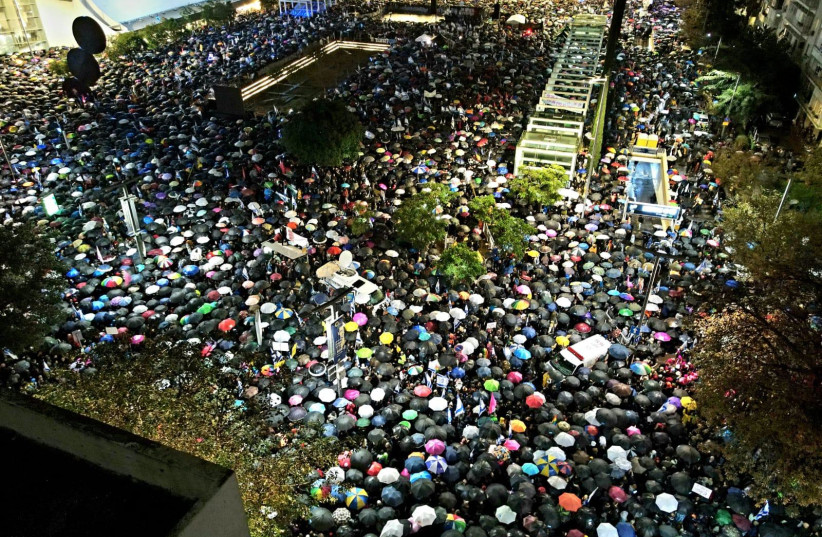The rift that opened between Israelis following the proposed judicial reform is deepening. The two sides hold uncompromising positions that give them a sense of moral purity. But how will their intransigence be judged if it turns out that it led to a violent internal conflict and severely undermined the Jewish people’s miraculous return to sovereignty?
The urgency of the moment obliges all of us to demonstrate maturity and responsibility, and to enter a dialogue aimed at reaching a compromise.
It is clear as day that the proceedings of the Knesset’s Constitution, Law and Justice Committee do not rise to the level of serious dialogue between the divided people. We need a real dialogue between the parties – using legal experts from all camps – that will produce a compromise that will not fulfill everyone’s dreams but will benefit us all as a nation.
Half of Israelis want dialogue
A Jewish People Policy Institute (JPPI) survey shows that 50% of Israelis would like to see dialogue on the reform before it is enacted, including 42% of those who voted for the coalition parties – and 56% of those who voted for the opposition parties. They understand that in the absence of real dialogue, ominous flames flicker just outside the gate.
These are the facts: 60% of Israelis feel that there is a high to certain likelihood that the struggle between the reform’s opponents and supporters will deteriorate into violence. This concern exists in all camps, at similar levels, regardless of political outlook, age, or religiosity level. Only 31% of Israelis, less than a third, think that the chance of such an outcome is low or nonexistent.

If violence, heaven forbid, breaks out, those who refuse to engage in dialogue today, may discover tomorrow that they acted irresponsibly in the face of danger. They won’t be able to say, “Our hands have not shed this blood, and our eyes did not see it happen” (Deuteronomy 21:7).
We have experienced severe traumas in the course of our national life, such as the Altalena Affair, Rabin’s assassination, and the disengagement from Gaza. Each of these events stands on its own and cannot be compared to the others – but all of them were moments when Israeli solidarity was put to a difficult test, and ultimately prevailed.
At this juncture, another perilous moment is brewing: according to the JPPI survey, 35% of Israelis – one in three – fear civil war. We double-checked: these Israelis don’t think it’s just political rhetoric or media spin; it’s a real concern.
Dialogue can prevent war
AGAINST THIS backdrop, robust public action is required to promote true dialogue. The split in the nation over the reform is a fact – 41% support it and 44% oppose it – but the divide must not translate into civil war. The mechanism for preventing this is dialogue, in which we open our hearts and hear the plight of the other with a true desire to reach a meaningful compromise.
Compromise is not only the sole practical way to prevent disaster; it is also the will of the people: JPPI’s survey shows that Israelis do think the judiciary is in need of change (only 16% oppose all change), but they also believe that it shouldn’t be the revolutionary change proposed by the minister of justice (only 22% support every change proposed in the reform package).
If the clear will of the Israeli public is to be realized, it is impossible – indeed verboten – to hide behind the argument that “there were elections, and the matter was decided.” At the same time, it is impossible – indeed verboten – to stick our heads in the sand and claim that any change heralds the “end of democracy.”
The desired compromise must preserve the three-branch structure of government, with a healthy tension between them that ensures that no one branch gains dominance over the others, and empties them of substance and meaning. Those seeking the reform claim that it is necessary because Israel’s judiciary has overstepped its bounds, while those opposed to the reform claim that it will enable the executive branch to reign over the others. What is required, therefore, is balance.
Unfortunately, Israel is not ready to reach an agreement on the enactment of a full constitution with a bill of rights, as is customary in Western democracies. The difficulty stems from the ongoing culture war between Israel’s different ideological camps.
But Israel must accept the rules of the game by which the culture war should be conducted. These rules are anchored in all liberal democracies – in laws that cannot be changed by a simple coalition majority – with regard to legislation, adjudication, and regulation of the activity of the governmental institutions.
The lack of supermajority laws – that do not rest on shifting sands – is pushing Israel down a slippery slope of governmental instability. The constitutional vacuum creates a temptation that Israeli governments (both past and present) find irresistible; they change the rules as they see fit, according to momentary needs.
The current crisis can be a national opportunity to rectify the situation through broad compromise on the rules of the game that would bind us from here on out. To achieve this, actual dialogue is required.
Politicians – come to your senses. The writing is on the wall.
The writer is president of the Jewish People Policy Institute (JPPI).
